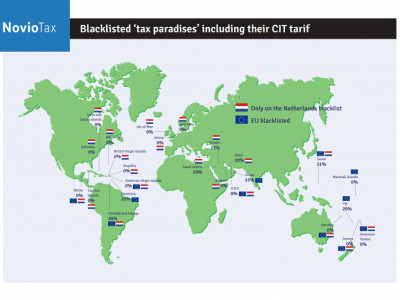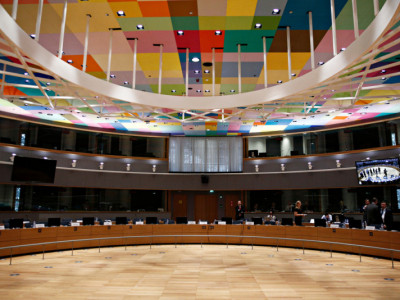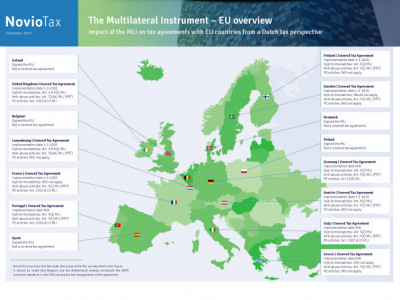Dutch implementation of the Mandatory Disclosure Directive (DAC6)
Following up on our June 2018 news item ‘This close to disclose?’ where we discussed the EU Directive on Mandatory Disclosure (Directive (EU) 2018/822, DAC6), the Dutch government is currently in the process to implement the Directive into domestic law. Prior to this, the government has launched an internet consultation offering interested parties an opportunity to respond to the legislative bill that implements the Directive into domestic law.
20 Dec. '18 3 min. Yoran Noij

The Directive in short
The Directive contains mandatory disclosure requirements for intermediaries and relevant taxpayers, aimed at boosting transparency to tackle aggressive cross-border tax planning. The arrangements described as “reportable” are very wide-ranging and therefore it cannot be assumed that taxpayers which do not want to be associated with “aggressive tax avoidance” do not have arrangements in place that are disclosable.
The Directive establishes 'hallmarks' to identify the types of schemes to be reported to the tax authorities. Certain hallmarks will only apply if also a broader “main benefit test” has been satisfied. This main benefit test is comparable to the Principle Purpose Test as outlined in BEPS Action 6, and is generally met if it can be established that the main benefit (or one of the main benefits) that a person may reasonably expect to derive from an arrangement is the obtaining of a tax advantage. For further information about the Directive, we refer to the news item ‘This close to disclose?’
Implementation in Netherlands domestic law
The draft legislation and explanatory notes of the implementation of the Directive have been presented by the Dutch government on December 19, 2018. Additionally the Dutch government launched an internet consultation offering interested parties an opportunity to respond to the legislative bill that implements the Directive into domestic law. Parties interested in responding to the legislative bill have to do so prior to February 1, 2019.
The draft legislation and explanatory notes presented by the Dutch government remains close to the contents presented in the Directive itself. The established ‘hallmarks’, as mentioned above, to identify the types of schemes to be reported to the tax authorities, that have been presented in the Directive are similar to the hallmarks as mentioned in the Dutch legislative draft.
The presented legislative draft and explanatory statements answer many questions about the Dutch implementation and interpretation of DAC6. An important aspect is that it provides clarity about the interpretation of terms mentioned in the Directive. For example the explanatory statement of the legislative draft specifies the various, sometimes vague, hallmarks.
Furthermore, the explanatory statements specify that the Directive does not lead to an obligation to investigate for assisting intermediaries. In other words, intermediaries who aid / assist another intermediary, thus do not devise an arrangement or offer it, are not obliged to investigate this arrangement if it has to be reported to the competent authority.
The Dutch government appears to be mild insofar of the extent of the legislative draft. The draft bill does not go further than the obligations prescribed by the Directive. The draft does not contain any more hallmarks than is necessary, nor does it extend to any more taxes than those included in the Directive.
The draft bill also includes a mandatory provision following article 25bis of Directive 2011/16/EU. This provision provides the possibility of imposing a pecuniary penalty under certain circumstances. This pecuniary penalty can range up to € 830.000, sanctioned by the Minister of Finance.
As mentioned above, the consultation closes on February 1, 2019. Once the input from parties has been processed and has been debated, the final bill is expected to be presented to the Houses of Parliament in the course of 2019.
ABOUT NOVIOTAX
NovioTax is a Dutch research-oriented tax consultancy firm with offices in Amsterdam and Nijmegen. Our employees are members of the Dutch Association of Tax Advisers (NOB) and the International Fiscal Association (IFA), have many years of experience and some are much sought-after guest speakers on tax policy and other topics that fall within their field of expertise. We typically serve midsized and large MNE clients, coordinate discussions with the DTA and closely cooperate with international law and tax law firms.
DISCLAIMER
The information contained in this blog is of general nature and does not address the specific circumstances of any particular individual or entity. Hence, the information in this blog is intended for general informational purposes and cannot be regarded as advice. Although we endeavor to provide accurate and timely information and great care has been taken when compiling this blog, there can be no guarantee that such information is accurate as of the date it is received or that it will continue to be accurate in the future. No one should act on such information without appropriate professional advice after a thorough examination of the particular situation. We do not accept any responsibility whatsoever for any consequences arising from the information in this publication being used without our consent.

















